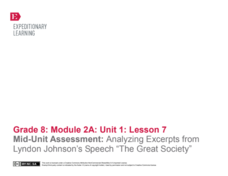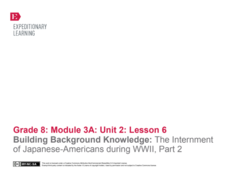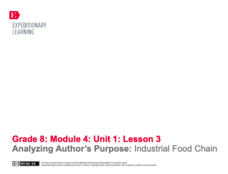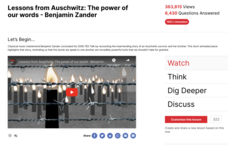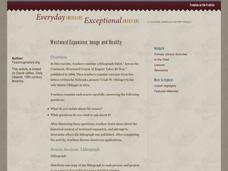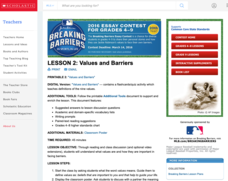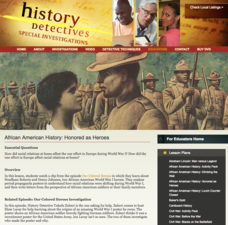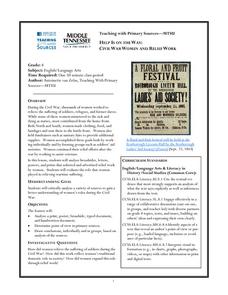EngageNY
Mid-Unit Assessment: Analyzing Excerpts from Lyndon Johnson’s Speech “The Great Society”
Time for intermission! Scholars take an intermission break from learning in the unit to work on a mid-unit assessment independently. Readers answer questions about Lyndon Johnson's Speech "The Great Society" to demonstrate the knowledge...
EngageNY
Connecting Ideas in Primary and Secondary Sources: What Led to the Attack on Pearl Harbor?
Let's make some sense of those thoughts! Scholars continue thinking about the different perspectives on Pearl Harbor. They analyze quotes from War in the Pacific, Day of Infamy, and Fourteen-Part Message. Readers tape each quote to chart...
EngageNY
Studying Conflicting Information: Varying Perspectives on the Pearl Harbor Attack, Part 2
Scholars take another look at Japan's Fourteen-Part Message. They then take turns adding ideas to sentence starters to create ideas about the different perspectives of government. To finish, groups mix and mingle to share their sentences...
EngageNY
Building Background Knowledge: The Internment of Japanese-Americans during WWII, Part 4
Learners use a Analyzing Mediums handout to detail the advantages and disadvantages of communicating with mediums such as artwork, photographs, and political cartoons in the Japanese-American Internment during World War II primary...
EngageNY
Building Background Knowledge: The Internment of Japanese-Americans during WWII, Part 2
Scholars learn about primary sources with a Primary Sources: Japanese-American Internment during World War II packet. Pupils work with a partner to read challenging sources in the packet while making notes in the margins. They then...
EngageNY
Reading for Gist, Answering Text-Dependent Questions, and Determining Author’s Purpose: Industrial Food Chain
A Reading Closely: Guiding Questions handout leads readers to discover the gist of The Omnivore’s Dilemma. While reading, pupils look closely at the words in the text and discuss their meaning. They use dictionaries when needed to answer...
EngageNY
Mid-Unit Assessment: Analyzing Author’s Purpose in Speech and Text
Part one of a mid-unit assessment relating to The Omnivore’s Dilemma includes listening to and analyzing a speech by Birke Baehr. Part two involves analyzing an excerpt from the text. The assessment ends with short response questions.
EngageNY
Analyzing Author’s Purpose: Industrial Food Chain
Using an Author’s Purpose anchor chart, groups examine a variety of text to determine the author's purpose. They then apply what they have learned to The Omnivore’s Dilemma. In pairs, they discuss what the text is about and why it was...
News Literacy Project
News Goggles: Lionel Ramos, Oklahoma Watch
Given all the recent criticism of the news media and coverage, it's crucial that young people are given the tools they need to evaluate what they see, hear, and read about current events. A video interview from "News Goggles" introduces...
Newseum
Media Ethics: Fairness Formula Starts With Accuracy
As part of a study of media ethics, young journalists apply a fairness formula to news reports. They look at accuracy, balance, completeness, detachment, and ethics to determine if the reporting is fair.
Channel Islands Film
Eminent Domain
After viewing the documentary The Last Roundup, a documentary about the transitioning of Santa Rosa from a privately own island to a National Park, class members debate the takings clause of the Fifth Amendment that permits the...
Constitutional Rights Foundation
The Lincoln-Douglas Debates — Springboard to the White House
The Lincoln-Douglas Debates saw two primary political candidates debating seven different times about one of the most important social movements in United States history. Middle and high schoolers read an article that describes the...
TED-Ed
Lessons from Auschwitz: The Power of Our Words
Some words are best left unspoken. Words matter, according to Benjamin Zander, conductor, teacher, and lecturer. To illustrate his point, Zander recounts a story told to him by a survivor of Auschwitz. As a result of her experience this...
iCivics
We the Jury
Learners take on the roles of jurors in a civil case to evaluate evidence and determine a verdict in this engaging online interactive experience.
PBS
Tiger of the Snows: Tenzing Norgay
Tenzing Norgay, the Sherpa man who made history when he reached the summit of Mount Everest with Sir Edmund Hillary, is the focus of an informative article. Class members read about Norgay's perspective on the way up the mountain, the...
University of Pennsylvania
Mock Trial of Alfred Dreyfus
What if scholars based mock trials on history? The fourth installment of a five-part series on the Dreyfus Affair asks learners to read various pieces of evidence before conducting a mock trial for a French officer. Teams answer...
EngageNY
Studying Conflicting Interpretations: Perspectives on Plessy v. Ferguson: Part 2
The Plessy v. Ferguson case was influential in establishing segregation in the United States. Scholars continue reading the court's decision in the case, seeking to understand the key reasons the court came to its decision. Pupils also...
Roy Rosenzweig Center for History and New Media
Westward Expansion: Image and Reality
As your young historians study Westward Expansion, practice in-depth primary source analysis with the documents and guidelines presented in this resource. They will examine a lithograph and excerpts from two letters written by a Nebraska...
Stanford University
Beyond Vietnam
On April 4, 1967 Martin Luther King, Jr. delivered his speech "Beyond Vietnam." The controversy that followed is the focus of a three-lesson plan unit that asks class members to consider the political and social implications of King's...
Scholastic
Lesson 2: Values and Barriers
Scholars investigate and discuss the importance of values and how they can be used to break barriers. Small groups work collaboratively to examine the text and draw inferences to answer questions. A writing assignment challenges pupils...
Curated OER
Socratic Seminar on Martin Luther King, Jr.’s Letter From Birmingham Jail
Key in the struggle to gain the rights of democratic citizenship was the April 1963 arrest of Dr. Martin Luther King, Jr. for civil disobedience. To deepen their knowledge and understanding of events during the civil rights movement,...
Curated OER
Bring Read-to-Learn Activities into Your Classroom
Shift your instruction from teacher-centered to student-centered, which requires learners to do the heavy lifting.
PBS
African American History: Honored as Heroes
To gain an understanding of the treatment of African American soldiers during World War I, class members watch an excerpt from the History Detectives film, Our Colored Heroes, and then examine three recruitment posters from that time...
Middle Tennessee State University
Help Is on the Way: Civil War Women and Relief Work
The role women played in the Civil War, especially in relief efforts, is the focus of this seven-page resource. Groups examine primary source materials to determine how this work reflected and expanded the traditional roles women held in...
Other popular searches
- Authors Point of View
- Teaching Point of View
- Author's Point of View
- Point of View Rubric
- Identifying Point of View
- Point of View Narrator
- First Person Point of View
- Animal Point of View
- Different Point of View
- Third Person Point of View
- Ants Point of View
- Message Point of View


